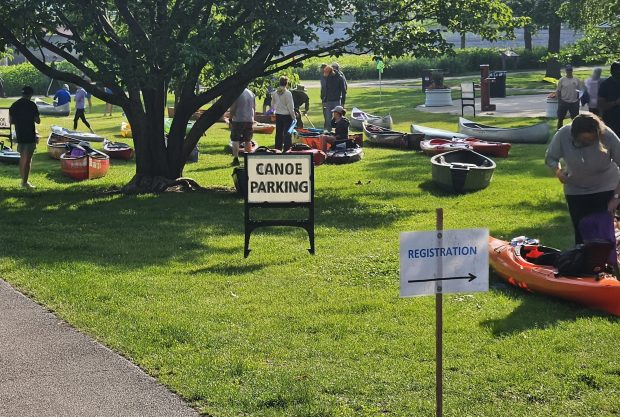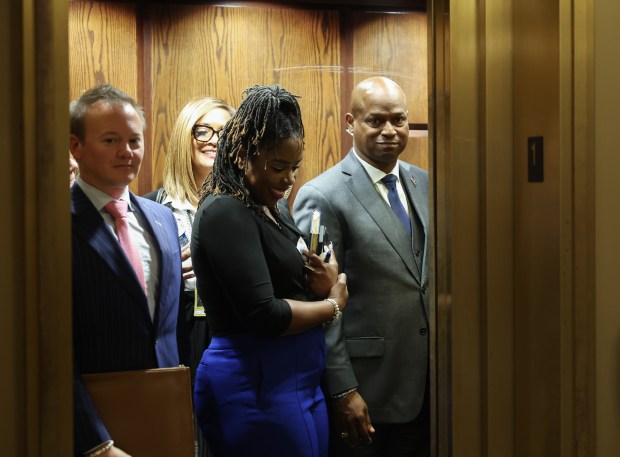More than 40 years ago life (call it fate or God) lifted me out of the classroom and planted me in a newsroom, a career reroute I sometimes regret despite my passion for journalism and the many wonderful opportunities it has brought my way.
Earlier this month I had a chance to combine my love of writing and of kids when West Aurora High School English teacher Katie Johnson invited me to speak to a couple of her sophomore honors classes about a topic that is near and dear to my heart: NEWS LITERACY.
In a nutshell, that means having the critical thinking skills to be able to evaluate the reliability and credibility of news sources and other forms of information, including those often mistaken for journalism.
If you read this column regularly you likely know why I jumped at the chance to talk to young people about this topic. There is so much disinformation floating around out there and because humans are wired to believe stories that reinforce their own world views, social media has made it far easier than ever to fall into the so-called information silos without ever coming up for clean air.
As I’ve also previously noted, thanks to a law passed by Illinois in 2021, school districts like West Aurora are taking critical steps to incorporate news literacy lessons into their curriculums.
But teaching today is far more challenging than it was decades ago. It’s become especially demanding as educators, already competing with social media for the minds of Gen Zers, are dealing with students whose mental health was impacted by a pandemic that also threw their education into chaos.
Many continue to struggle, Johnson told me, noting how much more difficult it is for them to express themselves in person after being isolated for so long via remote learning and social distancing.
It came as no surprise to me when a roomful of hands shot up when I asked if TikTok was their major “news” source. I also have no illusions my personal narration about the decline of newspapers was any more interesting than had the topic been the extinction of dinosaurs.
Still, I came out of those classrooms with a smile on my face.
That’s because they listened. They seemed inquisitive. Even if many of their questions were prepared, there was a positive vibe of spontaneous curiosity that made me realize these kids are not only bright but they care.
I walked in with a folder of notes, all of which remained unused as we talked about how a literate public and vibrant press is necessary to recognize credible information.
We paid special attention to the importance of local news and how critical it is to a community’s overall health. Local media outlets, I read somewhere, are like public libraries and museums, necessary to preserve culture and to understand important issues, particularly those that encourage people to get involved and hold public officials accountable.
All of which are in jeopardy with the rapid decline of local newspapers. A recent report by Northwestern University’s Medill School of Journalism indicated that by the end of 2025, the U.S. will have lost a third of its newspapers and two-thirds of its journalists since 2005.
We also discussed the sheer volume of misinformation out there, which makes every one of us susceptible to being duped. My goal was to help them with recognizing those red flags. Their generation, more than any other, must know how to set and monitor accuracy, a time-consuming task that requires far more work than in the past.
While on vacation, I received from Johnson what she said was “unedited” feedback that quite truthfully made my day. Not only did these kids politely express gratitude for the visit, they seemed to really grasp the connection between a free press and our country’s ability to hold on to the democracy on which it was founded.
One student wrote that she’s even encouraged to start reading local newspapers. And one of my favorite comments came from a classmate who was curious as to whether I’d “come to the point where you have lost your love for writing …or are you getting there?”
Good interview questions are those that provoke reflection. This one was excellent.
Those of us who have been in journalism a while have certainly felt beaten down by the sea change we’ve witnessed. We were reminded of that again on Monday from the Chicago Tribune’s front page story by Robert Channick about the final press run at the Freedom Center, where until Sunday evening the “largest newspaper printing plant in North America” also printed the Sun-Times, the New York Times and all Trib suburban papers, including The Beacon-News.
After more than 40 years on that press, Tribune Publishing purchased a smaller suburban press that will continue to put out the print products. Thankfully, we continue to grow online subscriptions, but common sense would tell you, a local staff that’s shrunk as dramatically as ours here in Aurora can’t begin to cover the Fox Valley as we once did.
As I told Ms. Johnson’s students, this is not just a loss for journalists. Which leads me back to that really good question from one of her students.
In some ways, the answer is yes, my passion for this profession has waned over these dramatically changing years. We no longer have a bustling newsroom with dozens of reporters, photographers and editors to ignite enthusiasm or story ideas. We don’t get raises or respect from our hedge fund owner or as many opportunities to work on significant projects or investigations as we once did. And yes, we know we are competing against social media sites – including TikTok for heaven’s sake – which often use our hard-earned content while giving us no credit.
But talking to these kids about news literacy was not only fun, it was invigorating. And above all else, it was hopeful. After my visit, Johnson put together a survey for those classes to find out exactly how her students felt about the topics we discussed.
All agreed it is important to know what is going on in the world. All but one also indicated their major news source is from social media, yet the vast majority “disagreed” or “strongly disagreed” with the statement that “most teens are media literate.”
Oh, and 100% agreed (most of them “strongly”) it is critical they have the ability to access, analyze, evaluate and use all forms of media.
“I know many students my age do not listen to the news … but I believe it is important to do this” and “not use sources such as TikTok,” wrote one student in an optional survey comment section.
“Media literacy, to me is a strong indicator of intelligence, as it signals one’s ability to form original thoughts and opinions,” wrote another student.
There were other comments equally worth passing along. But I will leave you with one that I believe should resonate “strongly” even with all the adults out there: “The idea of democracy being challenged … really stuck out to me,” wrote a student, adding that so much misinformation floating around out there is not only affecting today, it will also have an impact on “the next generation’s future as well.”
dcrosby@tribpub.com





